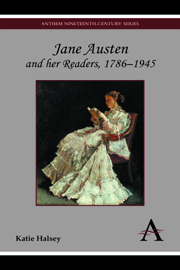Book contents
- Frontmatter
- Contents
- Acknowledgements
- Part One
- Part Two
- Introduction
- 4 Austen's Readers: Contexts I
- 5 Austen's Readers: Contexts II
- 6 Austen's Readers I: Affection and Appropriation
- 7 Austen's Readers II: Opposition and Resistance
- 8 Austen's Readers III: Friendship and Criticism
- 9 Austen's Readers IV: Sociability and Devotion
- Conclusion
- Notes
- Bibliography
- Index
7 - Austen's Readers II: Opposition and Resistance
from Part Two
Published online by Cambridge University Press: 05 July 2012
- Frontmatter
- Contents
- Acknowledgements
- Part One
- Part Two
- Introduction
- 4 Austen's Readers: Contexts I
- 5 Austen's Readers: Contexts II
- 6 Austen's Readers I: Affection and Appropriation
- 7 Austen's Readers II: Opposition and Resistance
- 8 Austen's Readers III: Friendship and Criticism
- 9 Austen's Readers IV: Sociability and Devotion
- Conclusion
- Notes
- Bibliography
- Index
Summary
The ‘Austen Controversy’ (1841-1845)
Between July 1841 and June 1845, Mary Russell Mitford and Elizabeth Barrett Browning engaged in a long-running affectionate epistolary argument about Jane Austen. Mary Mitford read Austen's novels in the Murray and Egerton editions but it is not known which edition/s Barrett Browning used, though it seems probable that she either owned or borrowed Bentley's edition. In the correspondence, both women demonstrate clearly their own allegiances through their manoeuvrings with Austen's name. They are both, more generally, oppositional readers who choose to define themselves against cultural stereotypes of the ‘bad’ female reader; in this series of letters, they also come to define their literary selves through their opposition to each other. In the course of their discussion we can trace two different visions of what a novel should be: Mitford's, whose model is Jane Austen, and whose belief is that accurate pictures of conventional life may contain within them the truths of the human heart, and Barrett Browning's, for whom ‘Conventional Life is not the Inward Life’. The clash is, in broad terms, between the novel of manners and the novel of psychological life, and between a pre-Romantic and post-Romantic literary sensibility. While Mitford passionately admires Austen, and considers her novels models of great literature, Barrett Browning objects to Austen on the grounds of lack of ‘poetry’, ‘inner life’ or ‘ideal aspiration’. When discussing Jane Austen, Charlotte Brontë poses the question ‘[can] there be a great artist without poetry?’, and finds Austen ‘without “sentiment,” without poetry’, concluding that she therefore ‘cannot be great’.
- Type
- Chapter
- Information
- Jane Austen and her Readers, 1786–1945 , pp. 153 - 170Publisher: Anthem PressPrint publication year: 2012

